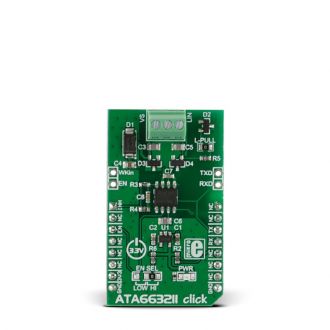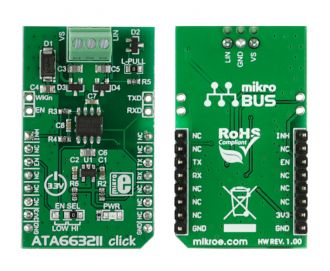
We strongly encourage users to use Package manager for sharing their code on Libstock website, because it boosts your efficiency and leaves the end user with no room for error. [more info]

Rating:
Author: MIKROE
Last Updated: 2019-04-02
Package Version: 1.0.0.1
mikroSDK Library: 1.0.0.0
Category: LIN
Downloaded: 6430 times
Not followed.
License: MIT license
ATA663211 click is a LIN transceiver that carries an Atmel ATA663211 IC and runs on 3.3V power supply. The click communicates with the target MCU through UART connection. The IC is designed to handle low-speed data communication in vehicles.
Do you want to subscribe in order to receive notifications regarding "ATA663211 click" changes.
Do you want to unsubscribe in order to stop receiving notifications regarding "ATA663211 click" changes.
Do you want to report abuse regarding "ATA663211 click".


Library Description
Defines and initializes driver's UART bus. Declares and defines driver's functions for sending and receiving data bytes, also for checking if data byte ready for reading. It also offers wake-up, sleep mode and check Inhibit pin functions.
Key functions:
Examples description
The application is composed of three sections:
void applicationTask()
{
char tmp;
uint8_t rdyFlag;
// RECEIVER - UART polling
rdyFlag = ata663211_byteReady();
if (1 == rdyFlag)
{
tmp = ata663211_readByte();
mikrobus_logWrite( &tmp, _LOG_BYTE );
}
// TRANSMITER - TX each 2 sec
/*
for (tmp = 0; tmp < 9; tmp++)
{
ata663211_writeByte( MESSAGE_DATA[tmp] );
mikrobus_logWrite( "MESSAGE SENT", _LOG_LINE );
}
Delay_ms(2000);
*/
}
Other mikroE Libraries used in the example:
UART​Additional notes and informations
Depending on the development board you are using, you may need USB UART click, USB UART 2 click or RS232 click to connect to your PC, for development systems with no UART to USB interface available on the board. The terminal available in all MikroElektronika compilers, or any other terminal application of your choice, can be used to read the message